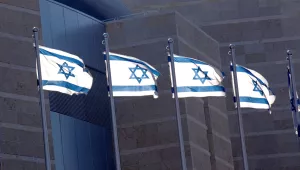President Bush likes to portray the war in Iraq as a Churchillian war on appeasement. As he put it in last week's press conference, "I thought it was important for the United Nations Security Council that when it says something, it means something. ... Empty words would embolden the actions of those who are willing to kill indiscriminately."
He has apparently failed to notice that his administration caved in to two of al Qaeda's central grievances -- the infidel presence in Saudi Arabia and the sanctions on Saddam Hussein's Iraq. This contradiction bodes ill for the U.S. occupation of Iraq.
In his 1996 "Declaration of War against the Americans Occupying the Land of the Two Holy Places," Osama bin Laden described the American military bases in Saudi Arabia not only as a desecration of the holy land, but also as a staging ground for "Crusader-Zionist" attacks against Muslims throughout the Middle East. "Terrorizing you while you are carrying arms on our land is a legitimate and morally demanded duty," he declared.
After Sept. 11, 2001, an al Qaeda spokesman issued a statement entitled "In the Shadow of the Lances" on an Islamist Web site, in which he asserted the right to kill 4 million Americans in retaliation for violence against Muslims, particularly in Iraq. He claimed that U.N. sanctions had killed more than a million Iraqi children in the decade since the Persian Gulf War.
The war in Iraq was designed to defang both of these issues. Toppling Hussein and replacing him with a democratic government, the Bush administration reasoned, would obviate the need for sanctions or bases in Saudi Arabia and eventually reverse the cycle of resentment and terrorism in the Middle East.
This policy is contradictory on at least two levels:
— First, the conservative position on Sept. 11 is that the terrorists attacked us for who we are, not what we had done. As President Bush put it in his first post-Sept. 11 speech, "They hate our freedoms -- our freedom of religion, our freedom of speech, our freedom to vote and assemble and disagree with each other."
But then the administration turned around and said the only way to win the war on terrorism was to eliminate its root cause -- the "freedom deficit" in the Middle East, implicitly enabled by U.S. political arrangements with repressive regimes such as Saudi Arabia and Egypt.
The problem with this "forward strategy for freedom," as the administration now calls it, is that it suggests that terrorism is our fault. By withdrawing U.S. troops from Saudi Arabia and then giving up on a tough but successful policy of containment in Iraq, the administration handed bin Laden an enormous propaganda victory.
— Second, in appeasing bin Laden's remonstrations over infidel soldiers in Saudi Arabia, we simply picked up camp and moved to an equally charged place -- Baghdad, the epicenter of Mesopotamian civilization. The idea seems to have been that because a reliable source of oil is nonnegotiable, we need to secure it through collaboration with a more acceptable, freedom-loving state such as a liberalized Iraq. If the new Iraq could replace Saudi Arabia as our toehold -- leading not only Riyadh but also Damascus, Cairo and even Tehran to open up in the process -- then anti-American hatred would lose its raison d'etre.
Yet while our military presence in Saudi Arabia was particularly offensive to many Muslims, the occupation of Iraq is barely less so. We say they hate us for our freedoms, then we bring them our freedoms. Why would this eliminate or even mitigate terrorism? As one embittered Iraqi told the New York Times' John Burns, "The Americans ... have brought their infidel beliefs to Iraq. We hate them, and they are worse than Saddam."
The administration might respond that they are not trying to win over the terrorists, but rather the moderates who want and deserve the gift of freedom as much as anyone else. Even so, ruthless demagogues such as the Shiite cleric Muqtada al-Sadr can become popular overnight in a culture inclined to distrust liberalism as a colonialist ruse. Indeed, when coalition spokesman Mark Kimmitt oxymoronically called the growing Iraqi insurgency "enormously small," he hinted that this uprising might be just the opposite.
A judicious response to the Sept. 11 attacks would have been to declare the terrorists' hatred illegitimate and in any case unappeasable, and limit ourselves to attacking and capturing the terrorists wherever we find them. To prevent catastrophic terrorism, we should have launched a Marshall Plan to lock down Russian and Pakistani nuclear weapons and materials, by far the likeliest sources of nuclear terrorism. By forcing a liberal model on the people of Iraq as a confused apology for our relationship with the Saudis or sanctions on Hussein, we have validated the terrorists' claims of our fundamental culpability for Sept. 11 and whatever else is to come.
There's a word for this: appeasement. And as Bush himself loves to point out, appeasement only emboldens the appeased. That's what we've done in Iraq.
Mainland, Grant. “Reassessing America's Military Strategy; War of Appeasement in Iraq.” San Francisco Chronicle, April 21, 2004



